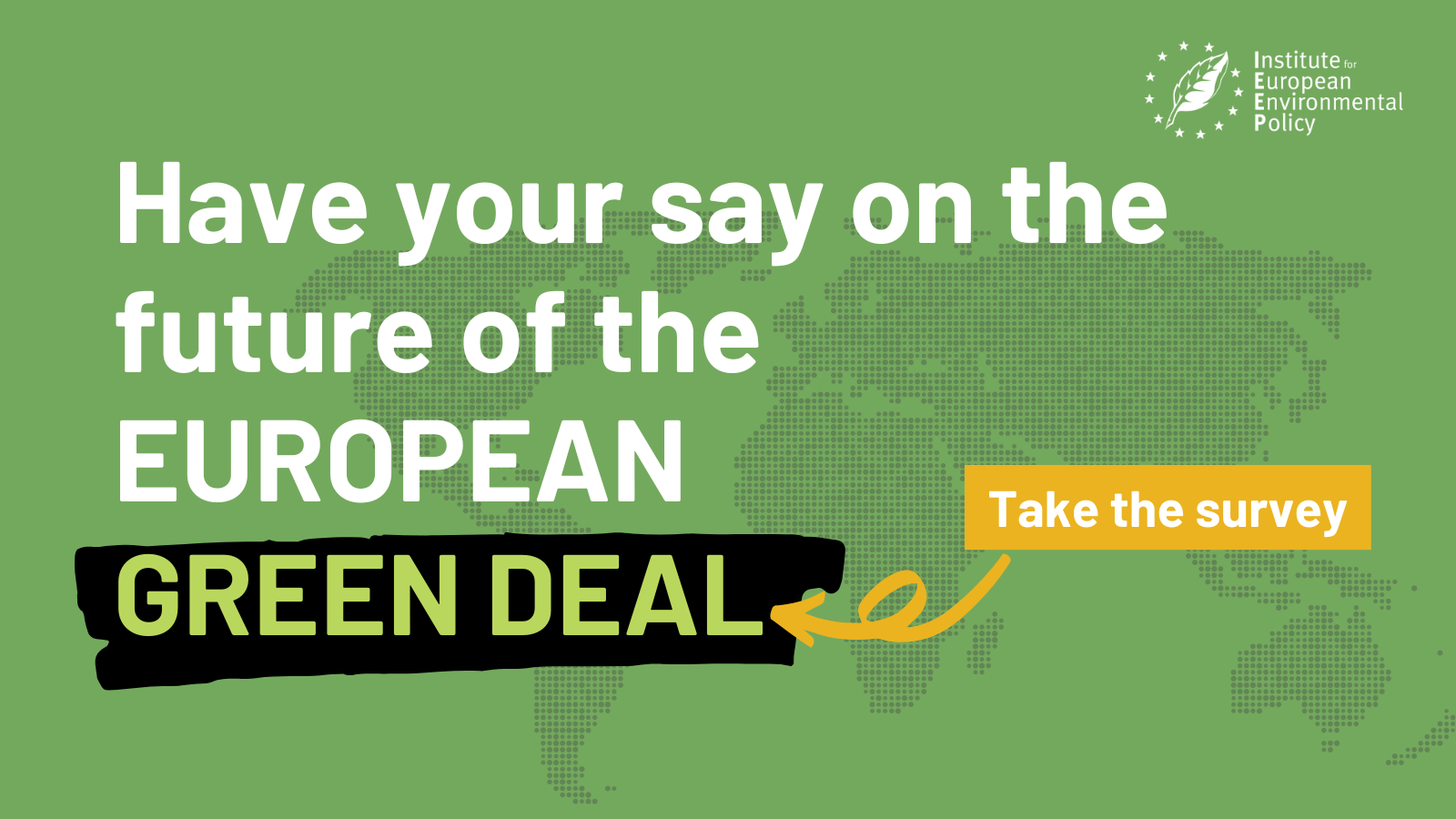Authors: Céline Charveriat, David Baldock
This report and its recommendations come from the Think 2030 conference held in October 2018 in Brussels, and were originally published in November 2018.
The newly elected European Commission President Ursula Von der Leyen has pledged a Green Deal for Europe in her first 100 days in office.
Last year, we asked sustainability experts from across the continent for policy recommendations. Here is what a Green Deal that’s aligned with SDGs should look like.
After more than half a century of peace and rising living standards, Europe’s current economic, political and social model is heading for a crisis.
Europe’s economy is failing to eliminate poverty, provide employment for all and address rising inequalities.
These failures are both fuelling existential doubts about the future of the European project and calls for taking back control of national destinies.
Meanwhile, the message from scientists is unequivocal: the high-carbon, resource and energy-intensive nature of Europe’s growth is unsustainable.
It is also creating an increasingly toxic environment that – among other issues – leads to premature deaths. If air pollution was adequately addressed, life expectancy in Europe’s 25 most polluted cities, for instance, could increase by almost 2 years.
In the context of a rising global population and accelerating environmental degradation, the intensifying competition over natural resources is becoming a major threat to Europe’s peace and security.
Challenges are many, but opportunities are there
In 2019, the European Heads of State, together with the next European Parliament and Commission, have a unique opportunity to turn Europe’s destiny around and meet citizens’ increasing alarm about climate change by defining a new, coherent strategy for the EU based on a shared vision for well-being, prosperity, peace and security and protection of nature.
This vision must be translated into a new over-arching post-2020 strategy for the EU, in line with the UN Sustainable Development Goals and long-term goals to 2050.
It should be supported by a set of science-based quantified targets to 2030 and by policies fully integrating the environmental, social and economic and security dimensions of sustainability.
It must include urgent short-term actions, map out the transition required and allow Europe to assert much-needed leadership on an increasingly fractured world stage.
Prosperity 2030
The EU needs to adopt a transition framework for the coming decades, reaching deep into economic goals and production systems. High-level measures should include:
- A clean macro-economic, monetary and growth framework enabling decarbonisation, promoting greater resilience to financial shocks and natural disasters and mobilizing public and private investments necessary for the ecological transition.
- A coherent mid-century decarbonisation strategy, aimed at achieving net-zero emissions before 2050, taking the urgent early steps needed to put us on track for that objective, and supported by sectoral industrial strategies and a carbon floor price.
- A comprehensive European policy for sustainable consumption, covering nutrition, mobility, housing and lifestyles, as a complement to the current circular economy package, and aiming at an 80% reduction in per capita material footprint by 2050.
- Align the EU’s budgetary resources to sustainability through tighter environmental conditionalities on the use of European funds, greater alignment of the Multiannual Financial Framework to National Energy and Climate Plans, and measurable targets for the environmental outcomes of each programme.
- Greater use of targeted economic instruments such as green taxation and public procurement policies at all levels of governance to shift individual and collective behaviours.
- Accelerated implementation of the sustainable finance action plan, in order to reorient capital flows towards a more sustainable economy.
- Increased support for eco-innovation, starting with a more ambitious eco-design directive and supported by mission-oriented goals and adequate instruments within Horizon Europe.
- A new generation of concrete waste prevention targets within the circular economy package and the plastic strategy based on an absolute reduction in annual waste.
- A new approach to Europe’s food systems (both production and consumption) ensuring coherence with relevant EU strategies (such as those on decarbonisation) and supporting farmers through results-based payments combined with support for knowledge transfer and innovation.
Wellbeing 2030
The social dimensions of Europe’s environmental policy must be recognized as central to delivering a legitimate sustainability transition. Critical measures at the EU level should include:
- Design a comprehensive environmental health strategy, providing a coherent framework for addressing public health threats linked most urgently with air pollution, which disproportionately harms the life chances of poorer communities, and supported by new regulations for chemicals and medicines.
- Strengthen the European Social Pillar of Rights to support a Just Transition, through a range of social interventions needed to secure jobs and livelihoods covering all potentially affected sectors, communities and regions.
- Integrate sustainability considerations in the reforms of income and wealth taxation and social protection systems, which will be necessary to address rising inequalities and demographic changes.
- Build the resilience of cities, rural communities and the wider environment through more effective adaptation strategies and action plans to address climate change.
- Ensure the adequate representation of the interests of both youth and future generations, by establishing an EU Guardian for future generations.
- Close the knowledge gaps regarding the connections between poverty, multidimensional inequality (generation, geography, gender, race, income) and sustainability in Europe through research and funding for socially innovative projects.
Nature 2030
The EU and its Member States need to work together to halt the deterioration of Europe’s natural capital, embark on an ambitious and credible restoration pathway.
- Adopt an ambitious EU biodiversity 2030 strategy, with smarter targets, specifying how biodiversity will be valued, further loss halted and large scale restoration achieved as well as a binding global agreement on biodiversity conservation, equivalent to the Paris climate agreement.
- A new Value-Based approach to the ocean, addressing both the needs of different stakeholders and the array of policies which have a bearing on the marine environment.
- A sustainable bioeconomy strategy, ensuring that the transition from fossil to bio-based resources remains within the scale compatible with SDGs and planetary boundaries.
- A fresh review of the challenge of improving soil management in Europe, exploring the option of a common policy.
- An increased focus across the Member States on implementing their Water Framework Directive commitments more fully and rapidly and stimulating more investment in water conservation.
Peace and Security 2030
To protect global peace and security, Europe needs to support a worldwide transition towards greater sustainability through the following means:
- Adopt a comprehensive horizon scanning and early warning system for environmental and climate change risks for Europe’s neighbourhood and other regions of strategic interest.
- Broaden the scope and increase the ambition of European climate diplomacy to include other major interrelated environmental risks, for instance by strengthening the focus on water issues.
- Adopt specific initiatives to improve the awareness and capacity of the EU and Member States’ military forces regarding the role of climate and environment in conflict prevention and resolution.
- Use the EU’s trade policy to push for harmonized and ambitious environmental standards worldwide and cooperation agreements around low-carbon and other environmentally friendly technologies.
- Carry out an assessment of the EU’s performance and also sharpen the targeting of EU external assistance vis-à-vis delivery of SDG implementation in third countries, whilst addressing the negative spillover effects of its own economic model.
Governance 2030
Achieving the transition will require major changes to Europe’s current governance system:
- Establish a European Panel for Sustainability (EPS), an independent, high-level scientific multidisciplinary body, based on the Intergovernmental Panel on Climate Change (IPCC) model, reporting to the European Council, to provide guidance and monitor progress.
- Include all levels of government in the design, implementation and monitoring phases of Europe’s new sustainability agenda, and ensure local areas that want to make faster progress are encouraged to do so.
- Tackle gaps in the implementation of legislation and in accountability through more effective use of Member State and European enforcement mechanisms and a more systematically facilitated public access to environmental justice.
- Incentivize businesses to go beyond compliance through a new sustainability certification scheme for European companies aligned with SDGs, independently verified and based on best available environmental footprint methodologies.
- Utilise Europe’s semester process to increase momentum, coherence and transparency in the transition, integrating well-being metrics into the process.
Think2030 is an evidence-based, non-partisan platform of 100 policy experts from European think tanks, civil society, the private sector and local authorities.



